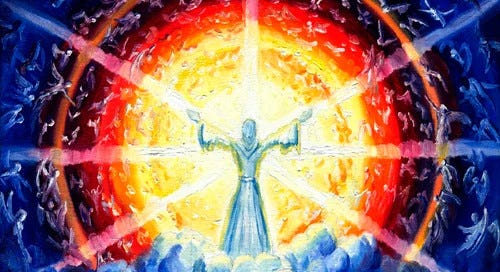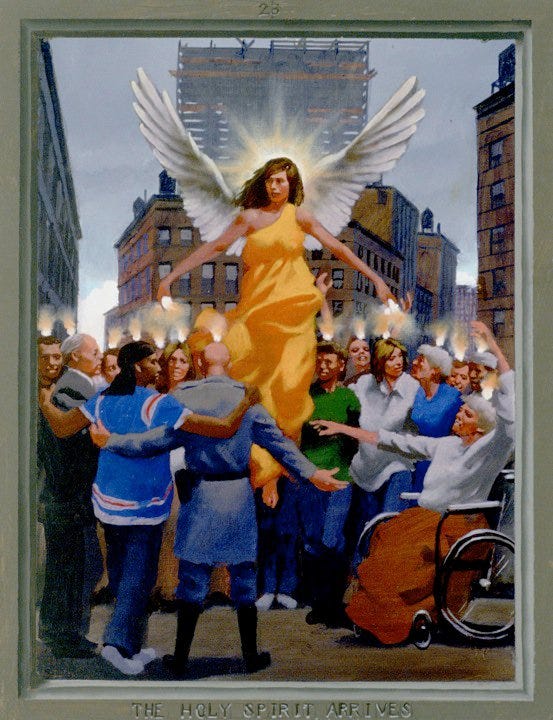Going back as far as the 4th century CE, Christian theologians have sometimes referred to the Fall of Adam and Eve as a felix culpa, a “happy fault.” This is because, so the logic goes, it created the necessary conditions for the redemption brought about by the Incarnation, Crucifixion, and Resurrection of Christ. God thus took the evil of the Fall and brought forth a greater good.
J.R.R. Tolkien articulates a similar theodicy in the “Ainulindalë,” the musical creation myth of his legendarium. The Luciferian angel Melkor attempts to drown out the voices of the other angels with a music of his own, “loud, and vain, and endlessly repeated; and it had little harmony, but rather a clamorous unison as of many trumpets braying upon a few notes” (Silmarillion, 26). The mythopoeic deity Eru Ilúvatar, however, weaves Melkor’s discord into the Music, so that “its most triumphant notes were taken by the other and woven into its own solemn pattern” (27). At last, Ilúvatar explains to his rebellious progeny:
And thou, Melkor, shalt see that no theme may be played that hath not its uttermost source in me, nor can any alter the music in my despite. For he that attempteth this shall prove but mine instrument in the devising of things more wonderful, which he himself hath not imagined. (27)
Tolkien undoubtedly had something like this at the back of his mind when, in his 1955 lecture “English and Welsh,” he exclaimed “O felix peccatum Babel!” (The Monsters & the Critics, 194) – that is, “O happy sin of Babel!” He’s referring to the story of the Tower of Babel, which is short enough that it’s worth quoting in full:
Now the whole earth had one language and the same words. And as they migrated from the east, they came upon a plain in the land of Shinar and settled there. And they said to one another, ‘Come, let us make bricks, and burn them thoroughly.’ And they had brick for stone, and bitumen for mortar. Then they said, ‘Come, let us build ourselves a city, and a tower with its top in the heavens, and let us make a name for ourselves; otherwise we shall be scattered abroad upon the face of the whole earth.’
ADONAI came down to see the city and the tower, which mortals had built. And ADONAI said, ‘Look, they are one people, and they have all one language; and this is only the beginning of what they will do; nothing that they propose to do will now be impossible for them. Come, let us go down, and confuse their language there, so that they will not understand one another's speech.’ So ADONAI scattered them abroad from there over the face of all the earth, and they left off building the city. Therefore it was called Babel, because there ADONAI confused the language of all the earth; and from there the ADONAI scattered them abroad over the face of all the earth. (Genesis 11:1-9, NRSV)
The “sin of Babel” is generally seen as overweening pride: humans believing that they could rival God by their own unaided effort. The Hebrew word for pride, גֵּוָה (gevah), comes from a root גָּאָה (ga’ah), that means “to rise, to grow up” – like a tower unto heaven. As punishment for their arrogance, God confuses their language and “scatter[s] them abroad over the face of all the earth,” to remind them of their proper place in the cosmic hierarchy. When Tolkien the philologist calls this a “happy sin,” he means that from the “confusion of tongues” at Babel come all the world’s languages in their multifarious diversity and complexity. What has been so often framed as a disaster is, for him, an unintentional source of great good.
Historically, the Christian Feast of Pentecost—which in 2025 falls on 8 June, they day I’m posting this—has been seen as the reversal of Babel, just as the Resurrection is the reversal of the Fall. Jesus has already been resurrected and shown himself to Mary Magdalene and Peter and the other apostles in Jerusalem before his Ascension. He assures his followers that though he must leave them now, “you will receive power when the Holy Spirit has come upon you, and you will be my witnesses in Jerusalem, in all Judea and Samaria, and to the ends of the earth” (Acts 1:8). Not long after, the apostles are gathered together in Jerusalem when the Holy Spirit descends upon them in tongues of flame and they begin to speak in many tongues:
Now there were devout Jews from every people under heaven living in Jerusalem. And at this sound the crowd gathered and was bewildered, because each one heard them speaking in the native language of each. Amazed and astonished, they asked, “Are not all these who are speaking Galileans? And how is it that we hear, each of us, in our own native language? Parthians, Medes, Elamites, and residents of Mesopotamia, Judea and Cappadocia, Pontus and Asia, Phrygia and Pamphylia, Egypt and the parts of Libya belonging to Cyrene, and visitors from Rome, both Jews and proselytes, Cretans and Arabs—in our own languages we hear them speaking about God’s deeds of power.” All were amazed and perplexed, saying to one another, “What does this mean? (Acts 2:9-12)
In ancient Mediterranean parlance, that litany of peoples and places is shorthand for the ecumene, the known world – everywhere to which the onetime inhabitants of Babel had been scattered. Notice, however, that neither the Apostles nor their astounded listeners gathered start speaking a single language, dictated from above. Rather, “we hear, each of us, in our own native language.” Babel is not “undone” through the imposition of a new “common tongue,” but through the recovery of deep solidarity within linguistic—which is as much to say, cultural, ethnic, and national—diversity.
In her 2019 Master’s thesis at the Graduate Theological Union, activist Erika Katske writes that it may be better to think of the “sin of Babel” as the attempt to impose uniformity through economic and linguistic exploitation. The God of Genesis 1 creates a world of abundant, startling variety, with everything from the stars and sun and moon to the fishes of the sea and the birds of the air to human beings. All beings are intimately woven into a divine ecology. Diversity, human as well as planetary, is part of God’s plan for Creation.
Genesis 11 does not explain why all humanity spoke the same language when the Tower of Babel was raised toward the heavens, but a clue may lie in the fact that in the ancient world, massive towers in massive cities weren’t usually the result of democratic decision-making. The mention of bricks and mortar in verse 11:3 can’t help but echo the Exodus narrative, where Pharoah compels his Hebrew slaves “with hard service in mortar and brick and in every kind of field labour” (Exodus 1:14). It is perfectly possible—probable, even—that the same rulers and economic elites who demanded the Tower be built in the first place were also the ones who imposed a single language from above.
In this light, we can read the Divine destruction of the Tower and the scattering of Babel’s inhabitants as a restoration of the human diversity God always intended. The pride of Babel was the raising up of a single class, a single voice, above all others, smothering them as Melkor sought to drown out the voices of his fellow-angels in the Music of Creation.
In my home country, the United States, Pride Month is taking place this year during a fascistic crackdown on Diversity, Equity, and Inclusion. The Trump regime, staffed to the gills with reactionary Tolkien fans and Christian nationalists, are building their own Tower of Babel, a temple to the idols of white supremacy, patriarchy, capitalism. Like the Númenóreans at the height of their continent-drowning hubris (Silmarillion, 340), they’ve mistaken Melkor for the hero of the piece and are now blaring a song as ugly as it is stupid out of Marshall stack amplifiers, hoping that the sheer, unendurable volume will pummel everybody else into submission.
We can’t let them win. We won’t let them win.
Forget about “speaking in tongues,” and fuck the liturgies of the imperial imagination, as the late Walter Brueggeman might have called them. To celebrate Pride this year, to exist openly as a queer person in Trump’s America, to build community in solidarity with those whose expressions of the divine imago Dei differ from our own (Genesis 1:27), is to live Pentecost in spirit and in truth. In a real and material way, an atheist trans woman living authentically under draconian anti-LGBTQ laws in Texas is a far better Christian than Pete Hegseth.
The “pride of Pride” is not an overinflated sense of self-importance, nor the imposition of identity from above, the repression of difference to uphold the power of those few who fulfil the imperial ideal. That is the pride of the Babel-builders. It is, rather, the Pride of Pentecost. It is the breaking-in of a world where one tree does not crowd out the other plants in its “garden swollen to a realm” (LotR, “The Tower of Cirith Ungol”, 901) - a world where a thousand expressions of God-imprinted humanity can rise up and flourish together.
Those with ears to hear, let them hear.







Another fantastic article. Happy Pride 🏳️🌈